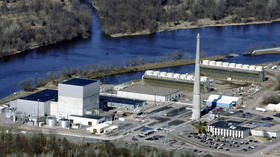Regulator explains ‘fish kill’ near leaky US nuclear plant
A temporary fix at the facility failed last week, leading to further contamination
A state regulator in Minnesota said hundreds of fish were killed after a nuclear power plant was forced to shut down due to a radioactive leak. A previous breach at the same site caused hundreds of thousands of gallons of contaminated water to spill into the environment.
The Minnesota Pollution Control Agency (MPCA) said an estimated 230 fish were killed not by radioactive contamination, but as a result of the shutdown, which was initiated last Friday after another leak was discovered at the Xcel Energy Monticello Nuclear Generating Plant near Minneapolis.
“As part of its normal operations, warm water from the Monticello plant enters the river, which the fish get used to. The fish kill is unfortunate but not unexpected given the significant temperature change that can occur when warm water from the plant stops flowing to the river during a shut down in operations,” the regulator said in a statement on Monday, adding that the affected animals include bass, channel catfish, common carp and one or more species of sucker fish.
The plant was taken offline on Friday to allow work crews to address the leak. While a temporary repair was attempted after the problem was first spotted last year, the fix failed, resulting in further contamination of the land around the facility. Monitoring equipment at the site showed that “hundreds of gallons” of contaminated water had escaped since the first repair.
Xcel Energy insisted the leak posed no threat to public safety and has since been fixed, while officials say the irradiated water has not yet reached the nearby Mississippi river. However, the operator acknowledged that some of the material was found in groundwater around the plant, which ultimately flows into the Mississippi.
The contaminated water carries the radioactive isotope tritium, 400,000 gallons of which poured into the ground from a broken pipe before the leak was noticed last November. Though the plant operator and local government were aware of the issue for months, the public was not informed until mid-March.
Tritium is a mildly radioactive isotope of hydrogen, often found in water used to cool nuclear reactors. The only way it can affect people is if they breathe it in or drink tritiated water, said Daniel Huff, an assistant commissioner at the Minnesota Department of Health.
While Xcel said it has fixed the latest leak, it is unclear when the plant will be back online, with company president Chris Clark unable to provide an exact timeline during a press conference last week. Nonetheless, he said he does not predict any significant impact on electric service, saying Xcel has “enough margin” to supply customers.
You can share this story on social media:








Comments are closed.